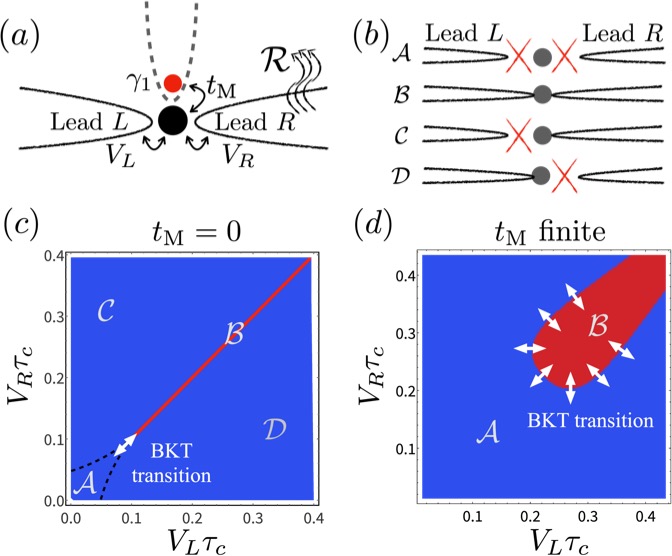Topological Quantum Computation Team of BAQIS has achieved advance in understanding the interplay between topological degeneracy and quantum phase transitions
2024/04/30
Recently, the Topological Quantum Computation Team at Beijing Academy of Quantum Information Sciences (BAQIS) collaborated with the Department of Physics at Tsinghua University, to theoretically explore the interaction between topological degeneracy and boundary quantum phase transitions. The resulted paper, entitled " Influence of topological degeneracy on the boundary Berezinskii-Kosterlitz-Thouless quantum phase transition of a dissipative resonant level", was published on April 12, 2024, in Physical Review B (Letter).
As one important characteristic of non-Abelian anyons, topological degeneracy is a prerequisite and crucial cornerstone for realizing topological qubits, and even further advancing topological quantum computation. Compared to ordinary local degeneracies, topological degeneracy possesses non-locality, and thus excellent resistance to local perturbations and interruptions. In addition, at the local scale, topological degenerate states exhibit non-trivial anyon degeneracy. This non-trivial degeneracy, however, has rarely been addressed in previous non-Abelian anyon detection schemes.
Researchers, starting from a theoretical standpoint, investigate the role of such non-trivial anyon degeneracy in quantum phase transitions, by case-studying the influence of a Majorana bound state, on Berezinskii-Kosterlitz-Thouless (BKT) transition of a dissipative resonant model. In this model, the observation of the BKT transition is hindered by strictly requested system symmetry, and thus not yet realized in-experiment. Our work shows that when the dissipative resonant model is coupled with a Majorana bound state that possesses topological degeneracy, the BKT transition no longer necessitates strict symmetry in the system. This result indicates that Majorana bound states can provide effective symmetry for boundary quantum phase transitions, greatly simplifying the experimental observation of such transitions. This phenomenon is anticipated as extendible to other transition systems, offering new insights into observing quantum phase transitions. Conversely, such non-trivial outcomes can also provide alternative evidence for the observation and confirmation of topological degeneracy like Majorana bound states.
The first author of this work is Dr. Gu Zhang, an Assistant Researcher of BAQIS. The corresponding authors include Dr. Gu Zhang, and Prof. Dong E. Liu, who is an Associate Professor at Tsinghua University and a Jointed Researcher of BAQIS. Dr. Zhan Cao, an Associate Researcher of BAQIS, also participates in this work. This work is supported by the Innovation Program for Quantum Science and Technology and the National Natural Science Foundation of China.
Link to the article:https://journals.aps.org/prb/abstract/10.1103/PhysRevB.109.L161110

(a). Coupling of a dissipative resonant model with a Majorana bound state (the red dot). (b). Four zero-temperature phases of a dissipative resonant level mode. (c). When Majorana decouples (i.e., when tM=0 ), BKT quantum phase transition (indicated by the white thick double arrow) strictly requires the system symmetry (VL=VR). (d). When tM≠0 , the symmetry requirement to observe the BKT transition is relaxed, thus simplifying the experimental realization.
 中文
中文 Email
Email QCloud
QCloud Log in
Log in
